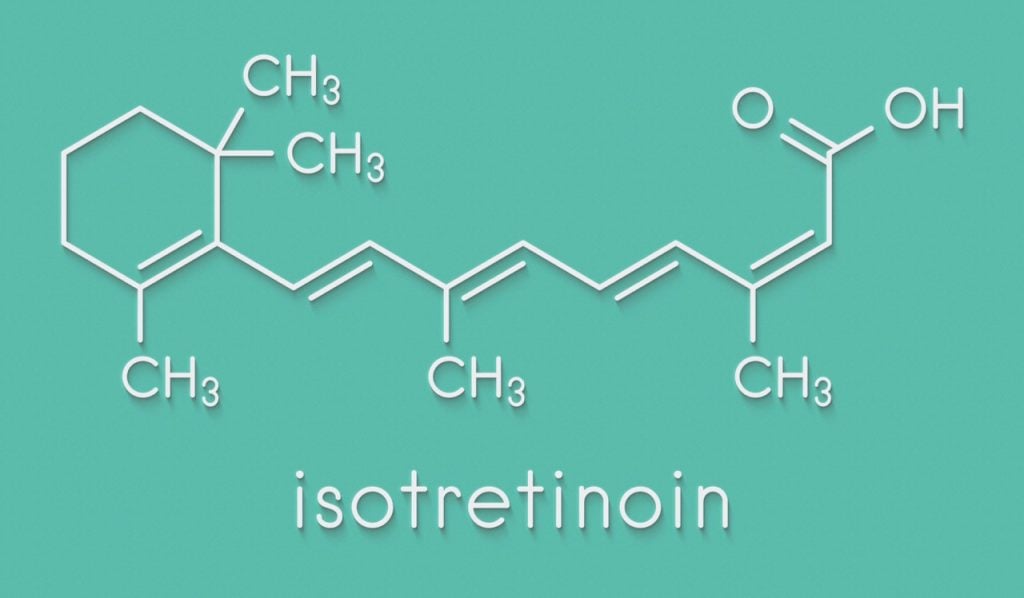The Power and Perils of Accutane
This is serious stuff. Accutane® is actually a brand name for isotretinoin, a very potent drug used primarily to treat persistent nodular acne. Isotretinoin in any form is available only by prescription from a certified pharmacy. It must be used under the close supervision of a board-certified dermatologist, and is carefully controlled. There are good reasons for that. Here are some ups and downs of Accutane.

Understanding the Fraught History of the Drug
Isotretinoin was originally studied and patented in 1969 by Roche Laboratories as a possible treatment for skin cancer. Isotretinoin (also known as 13-cis-retinoic acid) proved to be ineffective for that purpose so was set aside. Then, a decade later, the compound demonstrated surprising success as a treatment for severe acne that was not responsive to other therapies. The drug was subsequently approved by the FDA in 1982 as a treatment for acne and marketed as Accutane. It was a resounding success.
To counter compelling evidence that the medication could cause miscarriage, birth defects, and related complications in pregnant women, prescriptions came with a warning label, accompanied by cautionary information sent to doctors and pharmacists. Within a year, numerous lawsuits against the drug manufacturer were filed. Throughout the 1980s warning efforts escalated as the FDA and other regulatory agencies debated what to do.
Eventually, doctors were issued informed consent forms to be signed by patients and a series of increasingly stringent pregnancy prevention programs were put in place. Other side effects, including gastrointestinal complications and psychiatric disorders, were reported as well. In 2002 the original patents expired, opening the market to generic versions of Accutane selling at lower cost. In June 2009, buffeted by declining sales and escalating personal injury lawsuits, Roche Pharmaceuticals gave up on the entire venture, discontinuing manufacture and withdrawing the Accutane name and brand from the United States.
But isotretinoin didn’t go away. Why? Because it works. No other medication has proved to be as effective in treating the ravages of severe nodular acne and cystic acne. Today it’s marketed in the U.S. and worldwide under numerous labels and often unofficially still called Accutane. There are many ups and downs of Accutane that each person should consider before use.
Isotretinoin Is the Acne Drug of Last Resort
For most people acne is merely an annoyance, managed with good skincare and over-the-counter ointments and creams. Nodular acne is another matter entirely. It’s severe, it’s painful, and left untreated, it can produce severe scars. The condition causes hard lumps or nodules to form deep under the skin and manifest on the surface as angry red bumps. Lasting for weeks or even months, the nodules involve a type of bacteria that gets trapped in the pores, along with dead skin cells, hair, and the sebum (an oil made by the body) that keeps skin moist. The resulting infection leads to inflammation and disfiguring surface breakouts. Causes include hormones, genetics, skincare products that clog pores, some medications, and anxiety and stress. Nodular acne can afflict anyone. But it’s more common in adolescents and young adults. Androgen hormones cause oil in the skin to thicken, especially among those assigned male at birth.
The Most Effective
Cystic acne is a related condition also involving swelling and inflammation. Pus-filled cysts develop far under the skin as bacteria, oil, and dead skin cells are trapped and block pores. Ranging in size from a pea to a dime, the cysts are painful to the touch and crusty as fluid drains. Permanent scarring can occur.
Both types of acne require treatment by a dermatologist; over-the-counter potions and creams simply can’t do the job. That’s where isotretinoin/Accutane comes in. Prescribers refer to it as the drug of last resort. This is because it clears up nodular and cystic acne when nothing else can. Until the advent of Accutane in 1982, there simply was no effective way to deal with severe forms of scarring acne, as described in prestigious publications such as the Journal of the American Medical Association at the time. That’s still true today. Used properly, isotretinoin has a success rate approaching 90%, and in the majority of cases, the results persist for life.
But the devastating side effects are equally real, especially for women of child-bearing age.

Using Isotretinoin Safely
Isotretinoin is a man-made form of vitamin A called an oral retinoid. Taken during pregnancy, isotretinoin (or any form of oral retinoid) can cause serious problems, and while in-utero babies need vitamin A for healthy growth, the mother naturally produces sufficient quantities; too much can cause severe birth defects—the risk is as high as 60%. Hence the dangers of isotretinoin during this critical time. Women who are pregnant or trying to be absolutely cannot use this drug.
Because of this, strict controls for the prescription of isotretinoin are in place, due to the many ups and downs of Accutane. iPledge is the only website isotretinoin is available through. The FDA requires companies marketing any form of isotretinoin to install the site; all prescribers, pharmacists, and people taking the drug must register and log in required information on a regular basis. Women with child-bearing potential must commit to using two forms of effective contraception simultaneously for the duration of isotretinoin therapy, and for the month immediately preceding and a month after treatment.
Further, they must have two negative pregnancy tests 30 days apart before starting isotretinoin and a negative test before each prescription is written. Prescriptions are for 30 days only, a new one must be provided each month and filled within 7 days. Men taking isotretinoin must use a condom during sexual encounters in case the drug carries over into his female partner via the sperm. In addition, women agree to monthly blood tests to check for pregnancy; all users submit to monthly blood draws to monitor liver function. Everyone taking isotretinoin must participate in iPLEDGE, regardless of age or gender. Prescribing dermatologists meet monthly with patients to gauge response to the medication and monitor progress of the treatment plan.
Some Side Effects
Dosage is based on the weight of each patient. Most doctors start with a low dose and gradually increase amounts based on tolerance and response. The average course of treatment is 4 to 6 months, with most people beginning to show improvement in half that time.
Besides birth defects, isotretinoin can cause dryness of lips, eyes, nose, and skin. Aches, joint pain, problems with night vision, increased cholesterol, and elevated sugars are also possible; some risk of bowel disease has been noted. Usually side effects are mild and decrease as the body adjusts. The potential connection with mental health problems such as depression, anxiety, and suicidal thoughts is tougher to determine, especially since the upset and disfiguration of severe acne often lead to such thoughts. Some practitioners contend that treatment with isotretinoin actually lessens these behaviors by giving patients hope and a cure.
While it must be used with extreme caution, isotretinoin is the most powerful drug available for treatment of severe acnes. For many people, it’s life-changing because it’s the only thing that works. But before starting, make sure to consider all the ups and downs of Accutane


